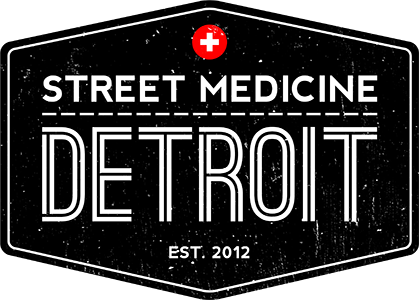It’s widely accepted that medical school constitutes four of the toughest years in the training of a future physician. Hours studying, absorbing as much information as possible for future patients (and to pass the next exam). Ultimately, it’s worth it. After four years of hard work, students leave medical school ready to take care of patients. However, this intense process does more than teach medicine. Medical students also learn about themselves. Their weaknesses. Their strengths. Their passions. Their values. Street Medicine Detroit board member and graduating fourth year medical student, Jessica Lee, recently reflected on her time at the Wayne State University School of Medicine, and how SMD shaped her experience.
Street Medicine Detroit will always be remembered as one of the most defining parts of my medical school experience. I would not be the same person that I am today without SMD’s influence. It has affected every aspect of how I practice medicine and I am thankful I got to be a part of an organization that makes such a large impact on the homeless population in Detroit.
I was introduced to SMD during my time applying to medical school by a friend already attending the Wayne State University School of Medicine. When I shared that I had been accepted to her school, she congratulated me and sent me this message, “Join my student org, STREET MEDICINE DETROITTT.” She gushed about the organization, and when the opportunity arose, I volunteered with SMD to see if it was truly as great as she had described. It was. After my first street run, I was hooked. I loved the mission of the organization, the chance to do clinical work, but most importantly, I loved the patients and their stories.
As a first and second year, we are expected to hone our history taking skills. These patients were more than willing to share their medical histories and, as they did, they shared parts of their life stories, too. The conversations I shared with patients truly highlighted the person behind the label of “homeless.” It challenged many of my views of homelessness. Their stories gave me insight into why it’s difficult to get back on your feet when you experience homelessness. Some people don’t have the resources to get help. For others, mental illness is a barrier to ending their homelessness. Regardless, people experiencing homelessness face numerous challenges that are often overlooked at first glance.
An example of a challenge that really sticks with me is the importance of a government ID. Aside from the when I received my first ID, I never thought of it as particularly special. Yet, I’ve met numerous individuals who lost their government ID through theft or personal catastrophic events such as a house fire. Without an ID, they are precluded from many assistance programs. More upsetting, though, is that reobtaining an ID is nearly impossible for many people on the streets. Often, they have lost their birth certificates and numerous school closures hinder obtaining school records. They do not have any mail addressed to them because they have no home where they can receive it. Without a means to prove their identity, individuals experiencing homelessness find themselves out of options before they even get started.
I never would’ve known about the barriers people experiencing homelessness face if I had not spent time with them through SMD. During my third and fourth year of medical school, I learned how to take what I learned and advocate for individuals experiencing homelessness in the hospital. I stood up for them when lack of transportation forced them to consistently miss appointments. I supported their claims that medication non-compliance was because their medications were stolen with their belongings. I assured others that these were not merely excuses, but realities of those that live on the street. I testified to these things because working with SMD exposed me to patients who have been affected by identical obstacles time and time again.
All in all, if I could summarize what I have gained throughout my four years with Street Medicine Detroit in one word, it would be ‘understanding.’ I understand the barriers limiting people experiencing homelessness. I understand there are hundreds of reasons for homelessness. As a result, I believe I’m better prepared as a medical professional to empathize with patients experiencing homelessness and appropriately meet their needs. Through my work with SMD, I have learned that there is much more than meets the eye with every person I encounter and I intend to carry that lesson throughout the entirety of my career as a physician.
Jessica Lee, MS4, SMD Co-Director of Logistics & HR
Congratulations to Jessica and her classmates (listed below) who will be graduating from medical school and transitioning into residency over the next few months.
Andrew Wayne - Family Medicine
Anirudha Rathnam - Neurology
Ankita Chatterjee - Internal Medicine
Anthony McClafferty - Internal Medicine
Eleanor Kotov - Emergency Medicine
Esther Chae - Obstetrics/Gynecology
Jawan Gorgis - Family Medicine
Jessica Koehler - Emergency Medicine
Jessica Lee - Pediatrics
Mariam Diskina - Obstetrics/Gynecology
Rob Dikeman - Emergency Medicine
Samantha Terranella - Surgery


